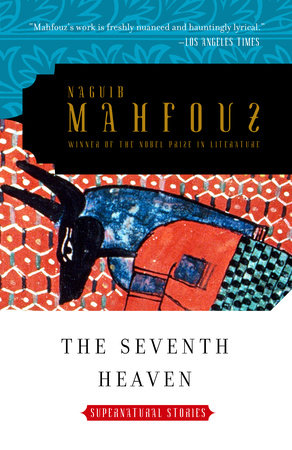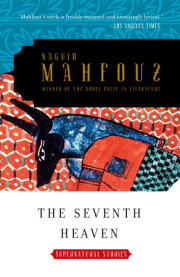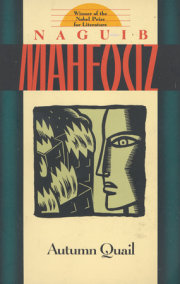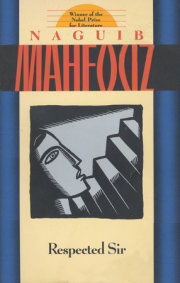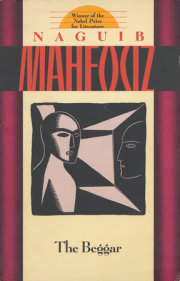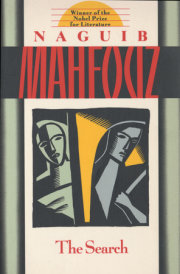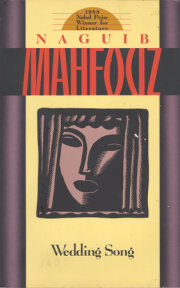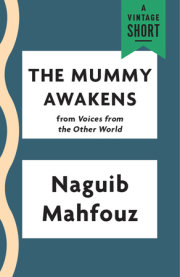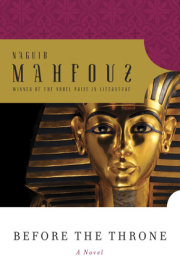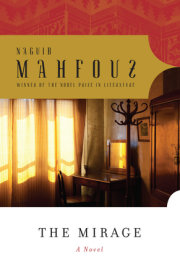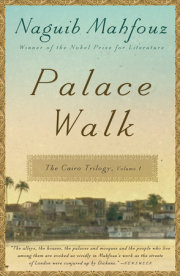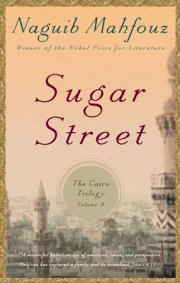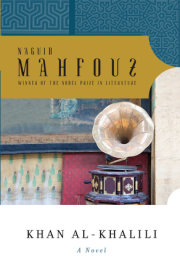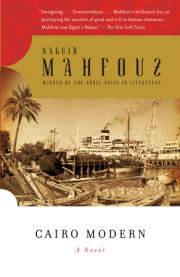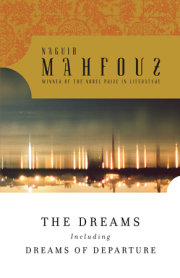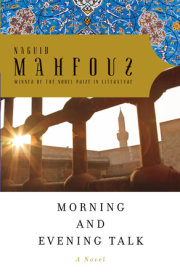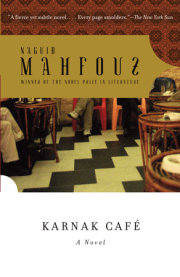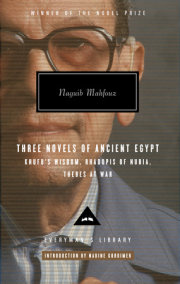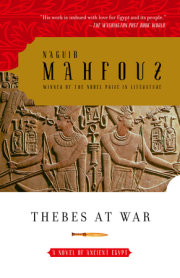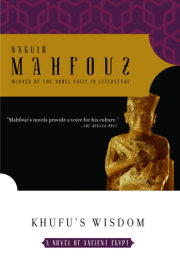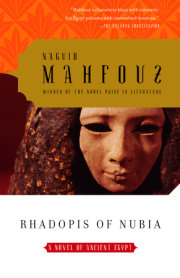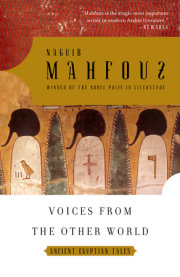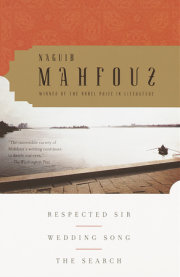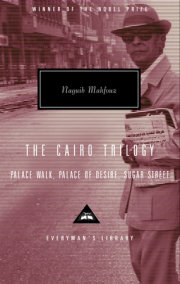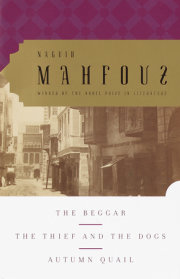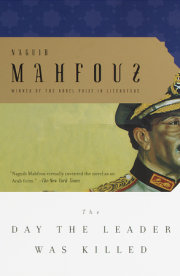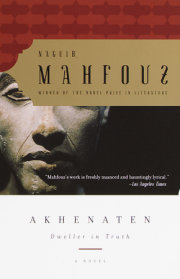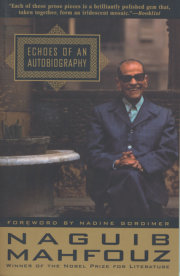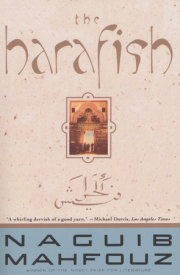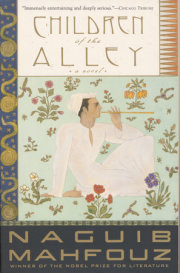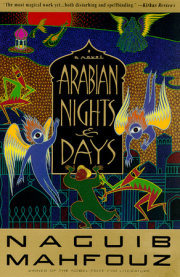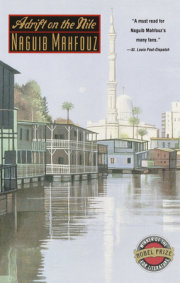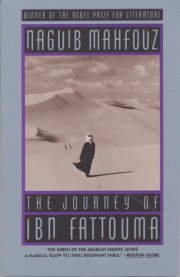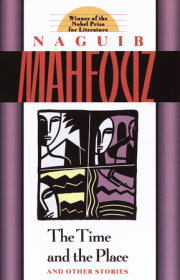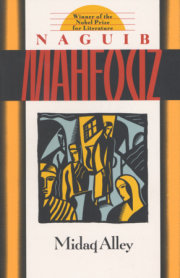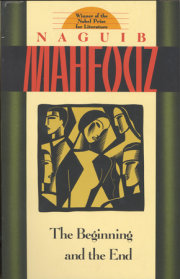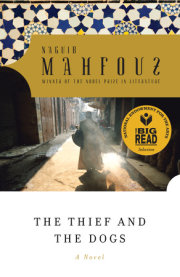The Seventh Heaven
1
A huge cloud surges over all existence, plunging through space. Everything pulses with a strange cosmic presence. Nothing like it has ever been, breaking living beings down into their basic elements, menacing all with destruction--or perhaps a new creation. Despite all this, he is still conscious of what is happening, seeming to live out the last moments of awareness. Seized by sensations that transcend imagination, he is witnessing things that none have seen before. Yet he is still himself--Raouf Abd-Rabbuh--without any fears, without evil whisperings within, and without any cares. He halts in the desert outside the ancient portal, floating in the dark, feeling as though he weighs nothing. He and his friend Anous Qadri are returning from their evening out. Where are you, Anous?
He heard not a sound, nor could he feel the touch of the ground. Then he had a bizarre sensation of levitation as he penetrated deeply into the churning, overspreading masses above. When he called out to his friend, no sound issued from him. He was present--and yet was not there at all. He was confused, yet not frightened, though his heart expected a direct reply from close by. The cloud thinned and began to vanish. The pulsing stopped completely. Then the darkness of night glittered with the luminous rays of stars. Finally I can see now, Anous! But what are you doing? The people are digging up the earth furiously, and with purpose. Then there is a young man sprawled on his back, blood pouring from his head. Raouf can see with a clarity greater than that granted by the starlight. How amazing! That's Raouf Abd-Rabbuh himself! Yet he is me--and none other than me!
He was cut off from him completely as he watched from very near. No, it's not a double nor his twin. That's definitely his body. And those are his shoes. Anous urges the men on in their work. He does not see him at all. Evidently, he thinks that the body laid out there represents all there is of his friend Raouf Abd-Rabbuh, the creature that observes him, unable to do anything. He sensed that he was not whole like the corpse on the ground. Had he become two beings? Or had he departed from the living? Had he been murdered and suffered death? Did you kill me, Anous? Did we not spend an enjoyable night out together? What did you feel when you killed me? How could you so disdain my friendship that you would try to claim Rashida for yourself? Didn't she tell me that she considered herself to be your sister from now on?
Ah--the men have carried my body to the hole, and are tossing it inside. Now they're shoveling dirt over it and smoothing the spot afterward, restoring the ground to its natural shape. Thus Raouf Abd-Rabbuh vanishes, as though he never was. And yet, Anous, I still exist. You have cleverly buried the evidence of your hardened crime--all trace of it is gone. Yet why are you scowling so? What is that sardonic look in your eyes? I freely confess--even though you cannot hear me--that I still love her. Did you think that our relationship was now over? Even death is too weak to destroy such a passion. Rashida is mine, not yours. Yet you are rash and were raised amidst evil. You grew up in the sphere of your father, Boss Qadri the Butcher--monopolist of the meat trade, plunderer of the poor and the dispossessed, a gross greaser of palms. Let me tell you that what you aspire to is not yours--your felony is to try to gain it by force. What will you do now? You, who wouldn't even go to the cafe without me, nor study without me, nor come and go to the university without me? We were the two best friends in our quarter, despite the infinite differences between us in money, status, and power. You may forget me, but I will not forget you. You should know that I have no longing for vengeance, or to hurt you in any way. All such weaknesses were buried with my body in that hole in the ground. Even the torture that your father's oppression inflicts on our alley provokes neither rage nor wrath nor rebellion within me. Rather, it is a common occurrence that the power of love rejects, creating instead a lofty desire free of any stain. I mourn for you, Anous. I never conceived you in this ugly image before. You are a walking skeleton, a bat-infested ruin. Murdered blood splotches your face and your brow. Your eyes give off sparks, while a serpent hangs from each of your ears. Your father's men file behind you on donkeys' hooves, with heads like crows, bound in manacles bolted with thorns. How it saddens me to have been the cause for which you sullied your pages. I am overwhelmed with grief because of it--while my sense of happiness shrinks to nothing.
2
In the midst of a sigh, Raouf found himself in a new city--brilliantly illuminated, but without a sun. The sky was a cupola of white clouds, the ground rich with greenery, with endless orchards of flowering fruit trees. Stretching into the distance were rows of white roses. Throngs of people met and broke up with the fleetness of birds. In an empty spot, he felt the loneliness of the first-time arrival. At that moment, there arose before him a man enshrouded in a white mist.
"Welcome, Raouf," the man said, smiling, "to the First Heaven."
"Is this Paradise?" Raouf asked, shouting with joy.
"I said, 'the First Heaven,' not 'Paradise,'" the stranger admonished.
"Then where is Paradise?"
"Between it and you, the path is very, very long," the man answered. "The fortunate person will spend hundreds of thousands of enlightened years traversing it!"
A sound like a groan escaped Raouf. "Permit me first to introduce myself," said the man. "I am your interlocutor, Abu, formerly High Priest at Hundred-Gated Thebes."
"I'm honored to meet you, Your Reverence. What a happy coincidence that I'm Egyptian myself!"
"That is of no importance," replied Abu. "I lost all nationality thousands of years ago. Now I am the defense counsel appointed by the courts for the new arrivals."
"But there can be no charge against me--I'm a victim. . . ."
"Patience," Abu said, cutting him off. "Let me tell you about your new surroundings. This heaven receives the new arrivals. They are tried in court, where I serve as their advocate. The verdicts are either for acquittal or for condemnation. In case of acquittal, the defendant spends one year here spiritually preparing for his ascent to the Second Heaven."
Raouf interrupted him, "But what then does 'condemnation' mean?"
"That the condemned must be reborn on earth to practice living once again; perhaps they would be more successful the next time," said Abu. "As for verdicts that fall between acquittal and condemnation, in such cases the accused is usually put to work as a guide to one or more souls on earth. Depending on their luck, they may ascend to the Second Heaven, or the length of their probationary period might be extended, et cetera."
"At any rate, I'm definitely innocent," Raouf blurted confidently. "I lived a good life and died a martyr."
"Do not be so hasty," Abu counseled him. "Let us open the discussion of your case. Identify yourself, please."
"Raouf Abd-Rabbuh, eighteen years of age, a university student of history. My father died, leaving my mother a widow who lives on a charitable trust from the Ministry of Religious Endowments."
"Why are you so satisfied with yourself, Raouf?" queried Abu.
"Well, despite my intense poverty, I'm a hard-working student who loves knowledge, for which my thirst is never quenched."
"That is beautiful, as a matter of principle," remarked Abu, "yet you received most of your information from others, rather than through your own thinking."
"Thought is enriched through age and experience," said Raouf. "And regardless, would that count as a charge against me?"
"Here a person is held accountable for everything," rejoined Abu. "I observe that you were dazzled by new ideas."
"The new has its own enchantment, Your Reverence Abu," said Raouf.
"First of all, do not call me, 'Your Reverence,'" Abu rebuked him. "Second, we do not judge a thought itself even when it is false. Rather, we denounce submission to any idea, even if it is true."
"Such a cruel trial! Justice on earth is far more merciful."
"We will come to justice," Abu reassured him. "How did you find your alley?"
"Horrible," spat Raouf. "Most of the people there are poor beggars. They are controlled by a man who monopolizes all the food--and who has bought the loyalty of the shaykh of the hara. He kills, steals, and lives securely above the law."
"That is an accurate description," Abu said. "What was your position toward all this?"
"Rejection, rebellion, and a genuine desire to change everything."
"Thank you. What did you do to achieve that?"
"It wasn't in my power to do anything!"
"Do you want to rise to the Second Heaven?"
"Why shouldn't I rise?" Raouf shot back. "My heart and mind both rejected what was happening."
"And your tongue?"
"Just one rebellious word would get it cut out."
"Yet even speech by itself would not satisfy our sacred tribunal," warned Abu.
"What kind of proceeding is this!" Raouf asked, his frustration growing. "What was I, after all, but a single individual?"
"Our alley here is full of unfortunates," rebutted Abu.
"My first duty was to acquire knowledge!"
"There is no dividing one's trust--and no excuse for evading it."
"Wouldn't one expect that would lead to violence?"
"Virtues do not interest us," said Abu dismissively. "What concerns us is truth."
"Doesn't it help my case that I was murdered over love?"
"Even that has an aspect which is not in your favor," said Abu.
Astonished, Raouf asked, "And what aspect is that?"
"That you put your faith in Anous Qadri--when he is the very image of his tyrannical father."
"I never dreamed I was so guilty."
"Though you have some mitigating circumstances, my brief in defending you will not be easy," worried Abu.
"Ridiculous to think anyone has ever succeeded in being declared innocent in this court."
"Indeed, only a rare few discharge their full obligation to the world."
"Give me some examples," Raouf challenged Abu.
"Khalid bin Walid, and Gandhi."
"Those are two totally contradictory cases!"
"The tribunal has another view," said Abu. "The obligation itself is what matters."
"There's no hope for me now."
"Do not despair--nor should you underestimate my long experience," said Abu soothingly. "I will do the impossible to save you from condemnation."
"But what could you say on my behalf?"
"I will say that you had a blameless beginning, under the most arduous conditions, and that much good was expected of you if you had only lived long enough. And that you were a loving, devoted, faithful son to your mother."
"The best I can hope for, then, is to be made someone's spiritual guardian?" Raouf fretted.
"This is a chance for you to recapture what had eluded you," Abu consoled him. "In our world here, the human being only ascends according to his success on earth."
"Then, Mighty Advocate, why don't you send down a guide for Boss Qadri the Butcher?"
"There is no one who does not have their own guide."
"How then," Raouf asked in confusion, "can evil continue?"
"Do not forget that the human being has free will," replied Abu. "In the end, everything depends upon the influence of the guide and the freedom of the individual."
"Wouldn't it be in the cause of good to eliminate this freedom?"
"The Will has determined that only the free may gain admission to the heavens."
"How could He not admit into heaven the pure saint of our alley, Shaykh Ashur?" Raouf remonstrated. "He doesn't practice free will, for all he does or says is filled with righteous inspiration."
Abu smiled. "What is he but a creation of Qadri the Butcher? He interprets dreams in Qadri's interests, relaying to him the private confidences from inside the houses that welcome his blessings!"
Raouf lapsed into defeated silence. He absented himself for a moment amid the ripe greenery adorned with rows of blooming roses, surrendering to the place's sweetness and grace. Then he said, sighing, "How tragic for a person to be forced to abandon this garden!"
"Be warned--it is sinful to wish to evade your duty!" Abu scolded.
"When shall I appear before the court?" Raouf asked.
"The trial is finished," announced Abu.
Raouf stared at him in stupefaction.
"The examination has been completed," said Abu calmly. "The defense was raised during the discourse between you and me. The verdict has come down: you are to be commissioned as a spiritual guide. Congratulations!"
3
The court determined to hold Raouf Abd-Rabbuh in the First Heaven for a short time in order to cleanse him of any stains, in preparation for his mission. Abu stayed at his side till he had finished his training and acclimation, receiving returning guides at the same time.
"I'd like to see Adolf Hitler," said Raouf. "Will he be coming now?"
"He was condemned, and has since been reborn in your very own alley. You saw him regularly."
"Hitler?"
"He is Boss Qadri the Butcher."
Dumbfounded, Raouf became quiet, then asked, "So who would the shaykh of the hara, Shakir al-Durzi, be?"
"Lord Balfour."
"And Shaykh Ashur, the false friend of God?"
"He is Khunfus, betrayor of Urabi's Revolution."
"I don't see them changing or learning from their repeated experience."
"That is not always the case. Do you know who your mother was?"
"Abu, she was an angel, surely!"
"She was Rayya, the infamous serial killer; yet look how she has progressed!"
Shaken, Raouf fell silent again. Just then Abu received the first of the incoming arrivals.
The one who just arrived said, "I am trying as hard as I can."
"I am aware of that," Abu answered, "but you must redouble your efforts, for the time has come for you to go up."
"I'm sure I know who that is," Raouf said, when the man had disappeared. "Isn't he Akhenaten?"
"Indeed he is. He is not very fortunate, however, for his probation has stretched on now for thousands of years."
"But he was the first to bring the news that God is one!"
"Verily, but he imposed the One God on the people by coercion, rather than by persuasion and rational argument. Hence, he made it easier for his enemies to later remove God from people's hearts the same way--by force. If it were not for his clear conscience, he would have been condemned."
"Why has his period here been so prolonged?"
Copyright © 2006 by Naguib Mahfouz. All rights reserved. No part of this excerpt may be reproduced or reprinted without permission in writing from the publisher.

